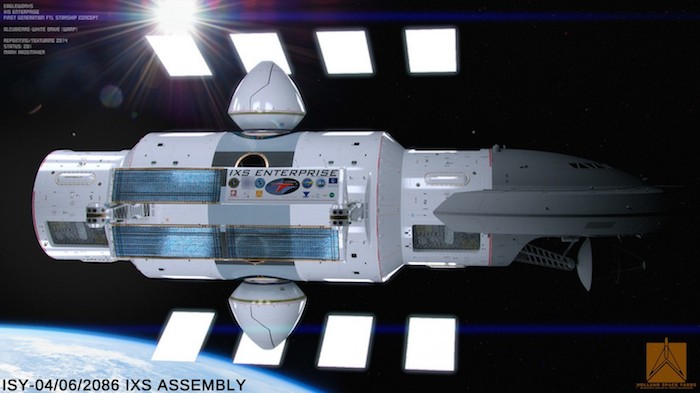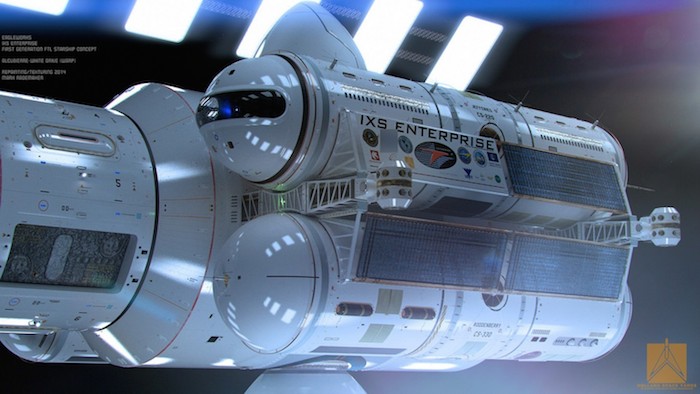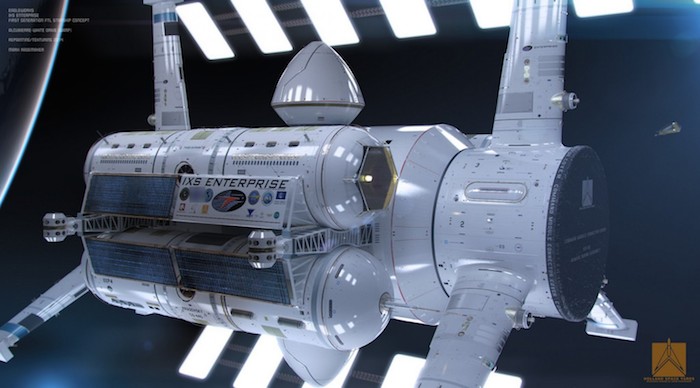.

“Warp speed, Mr. Sulu” (courtesy of Mark Rademaker/Flickr)
-
NASA engineer and physicist Harold White announced a few years ago that he was working on a potentially groundbreaking idea that could allow space travel faster than the speed of light. Yes, like in “Star Trek.”
And now, to boldly go where no designer has gone before, Mark Rademaker — who is collaborating with White — has created a CGI design concept for the “warp ship.” They’re calling it the IXS Enterprise.
“We wanted to have a decent image of a theory conforming Warp ship to motivate young people to pursue a STEM career,” Rademaker said in an e-mail interview. “It does have some Sci-Fi features that might never transfer to a possible final design, unless we really want to.”
A warp ship such as the IXS Enterprise could allow travel to interstellar space in a matter of weeks rather than, say, centuries. And the science behind why it might be possible is truly mind-boggling.
An over-simplified explanation is that the concept seeks to exploit a “loophole” in Albert Einstein’s theory of relativity that allows travel faster than the speed of light by expanding space-time behind the object and contracting space-time front of it. Io9 explains more:
Essentially, the empty space behind a starship would be made to expand rapidly, pushing the craft in a forward direction — passengers would perceive it as movement despite the complete lack of acceleration.
White speculates that such a drive could result in “speeds” that could take a spacecraft to Alpha Centauri in a mere two weeks — even though the system is 4.3 light-years away.
White, whose title is “Advanced Propulsion Theme Lead for the NASA Engineering Directorate,” has mathematically calculated a plausible way to accomplish this using far less energy than required by the original theory, which was proposed in 1994 by physicist Miguel Alcubierre.
His concept requires using large rings that surround the spacecraft (which you can see in the image above) to greatly reduce the amount of energy needed to warp space-time in front of and behind the spacecraft.
“The rings are most important as they will form the Warp bubble,” Rademaker said in his e-mail. “The way they are designed now will reduce the energy requirement needed to form the bubble. (By quite a large factor.) Also we tried to fill up as much space within the rings, it’s expensive to leave that open or unused.”
White and his team at NASA’s Eagleworks Labs are now working to create a “proof of concept” for this idea.
So how quickly can this all become a reality? According to White, in an interview with i09, proving that the math can become a reality in the lab is the first and probably most important step in the process:
What White is waiting for is existence of proof — what he’s calling a “Chicago Pile” moment — a reference to a great practical example.
“In late 1942, humanity activated the first nuclear reactor in Chicago generating a whopping half Watt — not enough to power a light bulb,” he said. “However, just under one year later, we activated a ~4MW reactor which is enough to power a small town. Existence proof is important.”
Rademaker’s design is posted in his Flickr account, and we’ve included the images with his permission:
.

.

.

.

.

Quelle: The Washington Post
5158 Views
